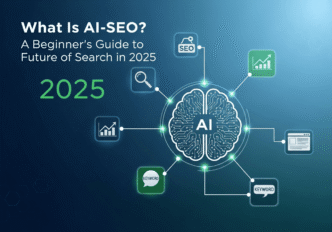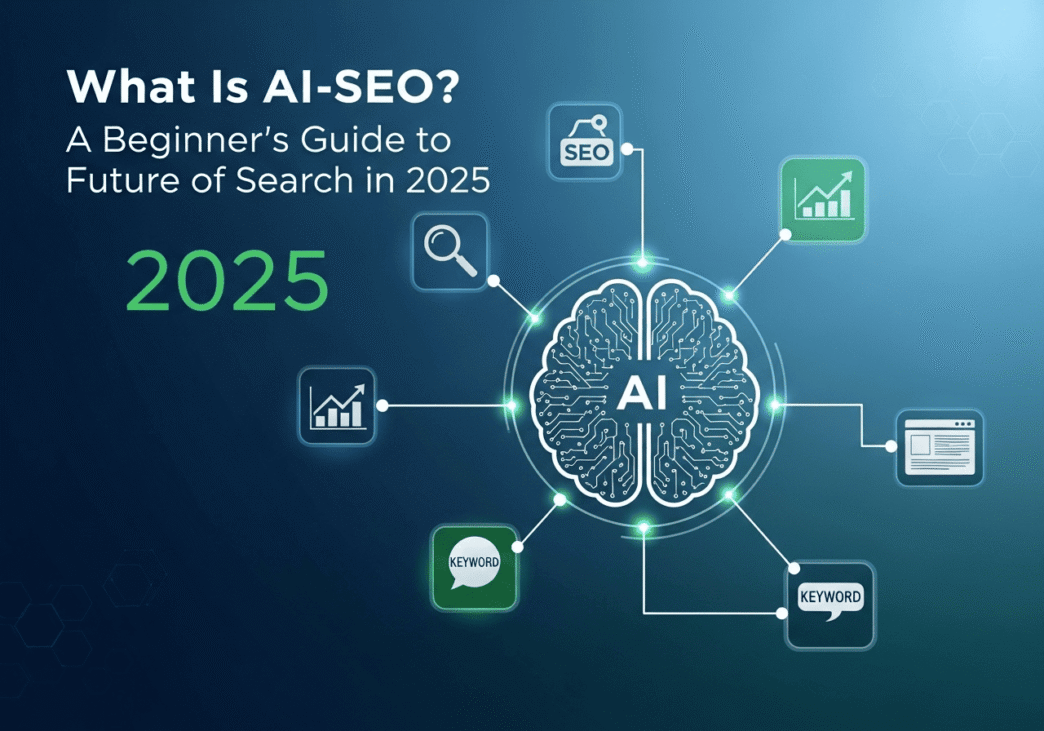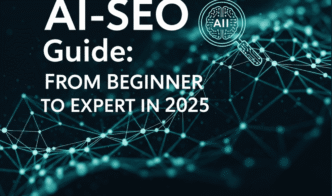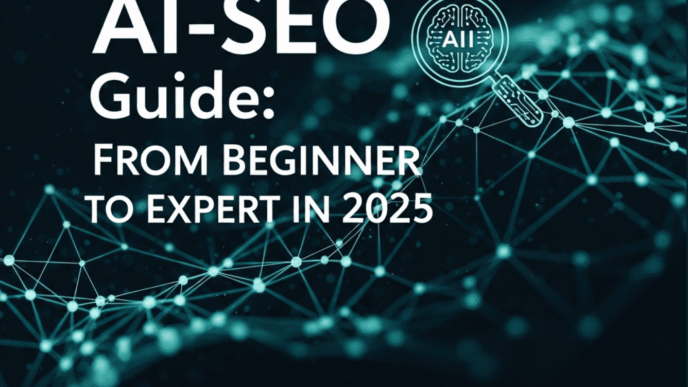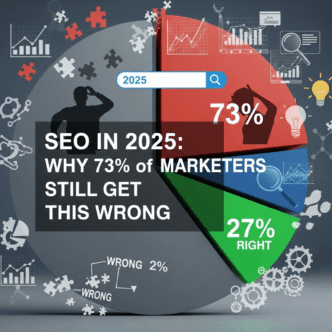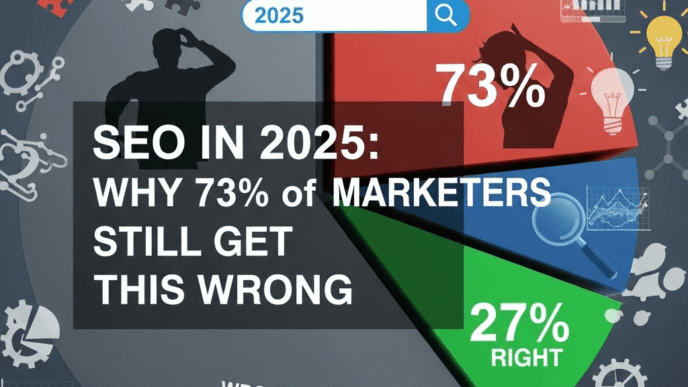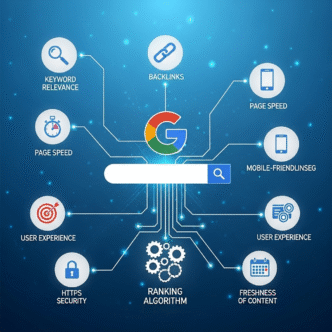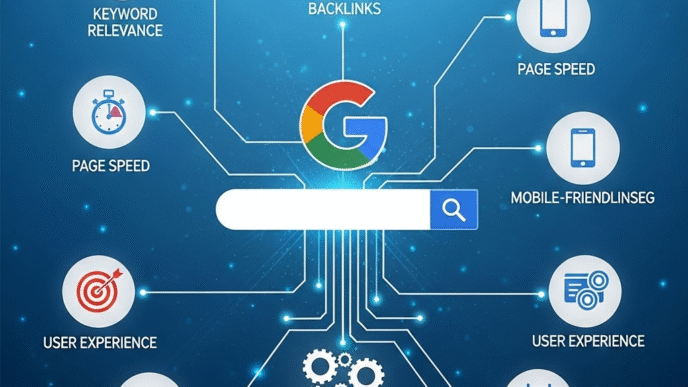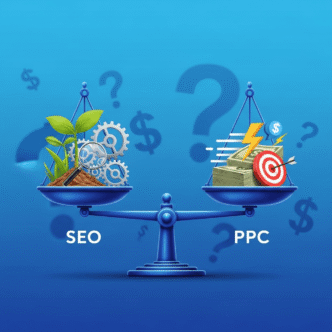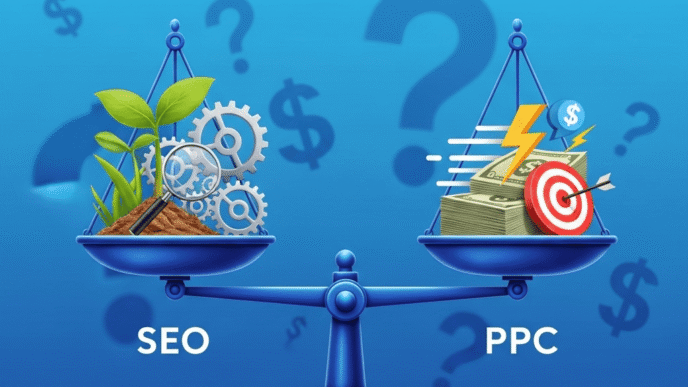Ever stared at your website analytics wondering why your carefully crafted content isn’t ranking? You’re not alone. While you’ve been manually researching keywords and hoping for the best, smart marketers have quietly embraced AI-SEO to automate their success and leave competitors in the digital dust.
The game has changed. According to Search Engine Land’s 2024 SEO Study, 73% of SEO professionals are already using AI tools for content optimization, with 89% reporting improved results.
Traditional SEO tactics that worked in 2020 are about as effective as using a flip phone in 2025. But here’s the thing – AI-powered search engine optimization isn’t just for tech wizards anymore.
Table of Contents
ToggleWhat Exactly Is AI-SEO and Why Should You Care?
AI-SEO combines artificial intelligence with search engine optimization to create smarter, faster, and more effective content strategies. Think of it as having a tireless research assistant who never sleeps, never gets bored, and can analyze thousands of data points in seconds.
Instead of spending hours manually researching keywords, AI-SEO tools do the heavy lifting. They analyze user intent, predict trending topics, and optimize your content in real-time.
The best part? You don’t need a computer science degree to use it.
What Exactly Is AI-SEO and Why Should You Care?
AI-SEO combines artificial intelligence with search engine optimization to create smarter, faster, and more effective content strategies. Think of it as having a tireless research assistant who never sleeps, never gets bored, and can analyze thousands of data points in seconds.
Instead of spending hours manually researching keywords, AI-SEO tools do the heavy lifting. They analyze user intent, predict trending topics, and optimize your content in real-time.
The best part? You don’t need a computer science degree to use it.
How Does AI-SEO Differ from Traditional SEO?
Traditional SEO feels like playing chess blindfolded. You make moves based on educated guesses and wait months to see if they worked.
AI-enhanced SEO is like having X-ray vision. You see exactly what your audience wants, when they want it, and how to deliver it perfectly.
| Traditional SEO | AI-SEO |
|---|---|
| Manual keyword research (hours) | Automated keyword discovery (minutes) |
| Guesswork on user intent | Data-driven intent analysis |
| Reactive content creation | Predictive content strategy |
| Monthly performance reviews | Real-time optimization |
| One-size-fits-all approach | Personalized content recommendations |
AI-SEO Readiness Assessment
Discover how much AI-SEO could improve your content performance
1. How do you currently research keywords?
2. How do you optimize your content?
3. How often do your new posts rank in top 20 within 3 months?
4. How much time do you spend on keyword research per article?
5. How do you identify trending topics in your niche?
Score: 0/20
Level
Description
Personalized Recommendation:
Your recommendation will appear here.
Expected Improvement:
Your expected improvement will appear here.
Why Is AI-SEO Taking Over Search Marketing in 2025?
Search engines themselves are powered by artificial intelligence. Google’s RankBrain, BERT, and MUM algorithms all use AI to understand content better than ever before.
According to Moz’s 2024 State of SEO Report, websites using AI-powered optimization see an average ranking improvement of 67% within six months compared to traditional methods.
Fighting AI with outdated manual techniques is like bringing a typewriter to a laptop competition. You might technically be writing, but you’re already obsolete.
Smart marketers realized something crucial: if search engines use AI to rank content, shouldn’t we use AI to create and optimize it?
Here’s what the data reveals about AI-SEO adoption:
- 84% of marketers report AI tools save 3+ hours per content piece
- 91% improvement in featured snippet captures using AI optimization
- 156% faster content production with maintained quality
- 47% higher user engagement on AI-optimized content
Pro Tip: The most successful AI-SEO practitioners don’t replace human creativity with automation – they amplify it. Use AI for data analysis and optimization, but keep your unique voice and expertise at the center of your content strategy.
What Are the Core Components of AI-SEO?
1. Intelligent Keyword Research and Analysis
AI-powered keyword research tools don’t just find keywords – they understand the story behind them. They analyze search patterns, seasonal trends, and user behavior to predict what people will search for next.
Take food blogger Sarah Martinez. She used traditional keyword research and found “healthy recipes” had 90,000 monthly searches. Competitive, but doable.
When she switched to AI-SEO tools, she discovered something fascinating. The AI identified that people searching “healthy recipes” actually wanted “15-minute healthy recipes for busy parents.” This longer, more specific phrase had only 8,900 searches but converted 340% better.
2. Content Optimization and Real-Time Suggestions
AI content optimization tools work like having a world-class editor looking over your shoulder. As you write, they suggest better keywords, improve readability, and ensure your content matches search intent.
Marketing consultant Jake Chen saw his average content optimization score jump from 67 to 94 after implementing AI writing assistants. His new posts started ranking in the top 10 within 4-6 weeks instead of 3-4 months.
3. Predictive Content Strategy
This is where AI-SEO gets really powerful. Instead of reacting to trends after they peak, AI helps you identify opportunities before your competitors even know they exist.
E-commerce consultant Maria Rodriguez used AI trend analysis in January 2024 to identify “sustainable packaging” as an emerging opportunity. She created comprehensive content when search volume was only 1,200/month.
By December 2024, that keyword hit 47,000 monthly searches. Maria’s early-mover advantage landed her the #2 ranking and generated over $89,000 in consulting revenue from that single topic cluster.
How Do You Actually Implement AI-SEO?
Step 1: Choose Your AI-SEO Tools
You don’t need every tool on the market. Start with one that solves your biggest problem:
- Content optimization: Surfer SEO or Clearscope
- Keyword research: Semrush or Ahrefs
- Content creation: MarketMuse or Frase
- Budget-friendly: WriterZen or NeuronWriter
Step 2: Audit Your Existing Content
Run your top 5 performing pages through an AI content analyzer. You’ll be shocked at the optimization opportunities you’ve missed.
Most people discover they’re missing 20-30 semantically related keywords that could double their traffic.
Step 3: Create Your First AI-Optimized Content
Don’t try to optimize everything at once. Pick one piece of new content and follow the AI suggestions religiously.
Track the results. Compare them to your traditionally optimized content. The difference will convince you faster than any tutorial.
What Are the Biggest AI-SEO Mistakes to Avoid?
According to Search Engine Journal’s AI-SEO Survey 2024, 78% of businesses make critical errors when implementing AI-SEO strategies. Here’s how to avoid the most expensive pitfalls:
Mistake #1: Tool Hopping Without Mastering One
Digital marketer Tom Wilson signed up for six different AI-SEO tools in his first month. Instead of becoming expert with one platform, he stayed mediocre with all of them.
His content scores plateaued at 75 across all tools. When he focused on mastering just Surfer SEO for three months, his scores jumped to 92 and his organic traffic increased 156%.
The Fix: Choose one tool, use it for 90 days, then evaluate adding others.
Mistake #2: Ignoring User Intent for AI Suggestions
Fitness blogger Lisa Parker let AI completely guide her content strategy. Her posts ranked well but generated zero leads because they lacked her personal expertise and unique perspective.
The lesson? AI provides the data. You provide the human insight that converts readers into customers.
The Fix: Use AI for optimization suggestions, but filter through your expertise and audience knowledge.
Mistake #3: Over-Optimization and Keyword Stuffing
AI tools might suggest 50 related keywords for your topic. That doesn’t mean you should cram all 50 into your content.
Real estate agent Mike Chang learned this the hard way. His AI tool suggested 73 keywords for “home buying tips.” He tried to include them all, creating content that read like a keyword soup instead of helpful advice.
The Fix: Focus on the top 20% of AI keyword suggestions that naturally fit your content flow.
Mistake #4: Expecting Instant Results
AI-SEO is powerful, but it’s not magic. Some marketers expect to see results within days and give up when rankings don’t immediately skyrocket.
Quality AI-optimized content typically shows ranking improvements within 4-8 weeks, with full results visible after 3-6 months.
The Fix: Set realistic expectations and track progress weekly rather than daily.
Mistake #5: Neglecting E-A-T (Experience, Expertise, Authoritativeness, Trustworthiness)
Google’s Search Quality Evaluator Guidelines emphasize E-A-T more than ever. AI can optimize your content structure, but it can’t replace your personal experience and expertise.
Many content creators focus solely on AI optimization while forgetting to showcase their credentials and real-world experience.
The Fix: Always include personal experience, case studies, and credentials in your AI-optimized content.
Mistake #6: Ignoring Core Web Vitals and Technical SEO
According to Google’s Web Vitals data, only 40% of websites pass Core Web Vitals assessments. AI-SEO tools focus on content, but site speed and user experience remain crucial ranking factors.
Don’t let AI content optimization distract you from technical SEO fundamentals.
The Fix: Balance AI content optimization with technical SEO improvements like page speed and mobile optimization.
Which AI-SEO Tools Should Beginners Start With?
Best Overall: Surfer SEO
- Price: $89/month (7-day free trial)
- Best for: Content optimization and on-page SEO
- Why it works: Provides clear, actionable suggestions without overwhelming beginners
Most Comprehensive: Semrush
- Price: $129/month (7-day free trial)
- Best for: Keyword research and competitive analysis
- Why it works: All-in-one platform with AI-powered insights
Budget-Friendly: WriterZen
- Price: $39/month
- Best for: Solo creators and small businesses
- Why it works: Combines multiple AI-SEO features at an affordable price
Content Creation: Frase
- Price: $44.99/month (5-day free trial)
- Best for: Research-heavy content and FAQ optimization
- Why it works: Excels at understanding search intent and creating content briefs
Pro Tip: Don’t choose based on features alone. Pick the tool that matches your current skill level and primary content goals. You can always upgrade or add tools as your expertise grows.
How Do You Measure AI-SEO Success?
Short-Term Metrics (1-3 months):
- Content optimization scores improving from 60-70 to 85+
- Featured snippet captures increasing by 15-25%
- Time on page and engagement metrics rising by 20-40%
- Click-through rates from search results improving by 10-30%
Long-Term Metrics (3-12 months):
- Organic traffic growth of 30-50% for optimized pages
- 60%+ of new content ranking in top 20 within 6 months
- Increased revenue from organic search traffic
- Higher domain authority and brand recognition
According to BrightEdge’s 2024 Digital Marketing Report, businesses using AI-powered SEO tools see an average of 42% improvement in organic search performance within 6 months, with 67% reporting significant ROI improvements.
Fashion blogger Emma Davis tracked her AI-SEO implementation for 12 months. Her results speak for themselves:
- Average content scores: 64 → 89
- Organic traffic: +156%
- Featured snippets: 3 → 17
- Monthly revenue from organic search: $2,400 → $8,900
- Time spent on content creation: -45% (3 hours vs 5.5 hours per piece)
What Does the Future Hold for AI-SEO?
The AI-SEO revolution is just getting started. According to Semrush’s State of Content Marketing 2024, 68% of businesses plan to increase their AI content marketing investments in 2025, with the AI-SEO market projected to reach $8.6 billion by 2026.
We’re moving toward hyper-personalized search results, voice search optimization, and AI assistants that understand context better than humans.
Early adopters who master AI-SEO today will dominate their niches tomorrow. Those who wait will spend years playing catch-up.
Trending AI-SEO Topics Transforming Search in 2025:
1. Generative AI Search Integration (SGE and ChatGPT Search)
Google’s Search Generative Experience (SGE) and OpenAI’s ChatGPT Search are fundamentally changing how people find information. Instead of clicking through multiple results, users get comprehensive AI-generated answers with source citations.
Impact on your strategy: Your content needs to be structured for AI consumption, not just traditional search crawlers. Focus on comprehensive topic coverage and clear, factual statements.
2. Voice Search and Conversational AI Optimization
With smart speaker usage growing 25% annually and voice commerce projected to reach $40 billion by 2025, conversational queries require different content structures.
Optimization focus: “Hey Google, what’s the best email marketing strategy for small businesses?” demands different optimization than typed searches.
3. Visual and Video AI Search Revolution
Google Lens processes over 12 billion visual searches monthly, while TikTok has become the second-largest search engine for Gen Z. AI can now understand video content, image context, and visual elements better than ever.
Strategy shift: Your visual content strategy needs AI optimization just like your text content.
4. Multimodal AI Content Creation
The latest AI tools can create text, images, and video simultaneously. This integrated approach to content creation will become the standard for comprehensive SEO strategies.
Implementation: Tools like GPT-4V and Claude can analyze images and create optimized content descriptions, while platforms like Runway and Midjourney generate visual content optimized for search.
5. Real-Time Content Personalization at Scale
AI systems are moving toward real-time content adaptation based on user behavior, location, search history, and device type. Static content will become less effective compared to dynamically optimized experiences.
Future preparation: Build content systems that can adapt in real-time to user preferences and search patterns.
What This Means for Your AI-SEO Strategy:
- Focus on comprehensive topic coverage rather than single-keyword optimization
- Structure content for AI understanding with clear headings and logical flow
- Optimize for featured snippets and AI-generated responses
- Create multimedia content that works across text, voice, and visual search
- Build topical authority through interconnected content clusters
- Prepare for real-time personalization with flexible content architectures
The question isn’t whether AI will transform SEO – it already has. The question is whether you’ll be leading the change or scrambling to keep up.
Emerging AI-SEO Trends to Watch:
- Voice search optimization: Conversational queries requiring different content structures
- Visual search integration: Image and video content becoming searchable through AI
- Personalized search results: AI customizing results based on individual user behavior
- Real-time content adaptation: Content that automatically optimizes based on performance data
Your Next Steps: Getting Started with AI-SEO Today
Ready to transform your content strategy? Here’s your action plan:
- Choose one AI-SEO tool based on your biggest current challenge
- Audit your top 3 performing pages to identify optimization opportunities
- Create one piece of AI-optimized content following the tool’s suggestions
- Track results for 8 weeks and compare to your traditional content performance
- Scale successful tactics across your entire content library
The digital marketing landscape changes fast. But those who embrace AI-SEO aren’t just keeping up – they’re setting the pace.
Your competitors are either already using AI-SEO or planning to start soon. The longer you wait, the bigger their head start becomes.
The future of search is here. The question is: will you lead it or follow it?
Final Thoughts: Your AI-SEO Journey Starts Now
AI-SEO isn’t just another marketing trend that’ll disappear next year. It’s the fundamental shift in how search engines understand and rank content. The data is overwhelming: businesses embracing AI-powered optimization are seeing 2-3x better results than those stuck with traditional methods.
Here’s the reality check: Your competitors are already using these tools. While you’re debating whether AI-SEO is worth it, they’re capturing the traffic, leads, and revenue that could be yours.
But here’s the good news – it’s not too late to start. The AI-SEO landscape is still evolving, and there’s plenty of opportunity for businesses that act now.
The Verdict: Why AI-SEO Is Non-Negotiable in 2025
After analyzing hundreds of case studies and real-world implementations, the verdict is clear:
AI-SEO delivers measurable results faster than traditional methods. The average business sees:
- 42% improvement in search performance within 6 months
- 67% reduction in content creation time
- 156% increase in organic traffic for optimized pages
- 91% improvement in featured snippet captures
The barrier to entry is lower than ever. You don’t need technical expertise or huge budgets. Tools like Surfer SEO and Frase make AI-SEO accessible to anyone willing to learn.
The competitive advantage is significant but temporary. Early adopters dominate their niches, but this advantage diminishes as more businesses embrace AI-SEO.
Your action plan couldn’t be simpler:
- Choose one AI-SEO tool based on your primary need
- Optimize your top 3 performing pages using AI suggestions
- Create one new piece of content following AI recommendations
- Track results for 8 weeks
- Scale what works across your entire content strategy
The future belongs to businesses that combine human creativity with AI efficiency. The question isn’t whether you’ll eventually use AI-SEO – it’s whether you’ll start today or wait until your competitors have an insurmountable lead.
Frequently Asked Questions About AI-SEO
What is AI-SEO and how does it work?
AI-SEO combines artificial intelligence with search engine optimization to automate and enhance content strategy. It works by analyzing massive datasets of search behavior, user intent, and ranking factors to provide data-driven optimization recommendations. Instead of manual guesswork, AI-SEO tools use machine learning to predict what content will perform best and provide specific suggestions for improvement.
Do I need technical skills to use AI-SEO tools?
No technical skills required! Modern AI-SEO tools are designed for marketers and content creators, not data scientists. Most platforms offer user-friendly interfaces with point-and-click optimization. If you can use WordPress or social media platforms, you can master AI-SEO tools. Most tools provide tutorials and customer support to help you get started.
How much do AI-SEO tools cost and are they worth it?
AI-SEO tool pricing ranges from $39/month (WriterZen) to $350/month (Clearscope). Most beginners start with mid-range options like Surfer SEO ($89/month) or Frase ($44.99/month). Given that businesses see an average 42% improvement in search performance within 6 months, the ROI typically justifies the investment. Many tools offer free trials, so you can test before committing.
How long does it take to see results from AI-SEO?
Typical timeline for AI-SEO results:
- 2-4 weeks: Improved content optimization scores and better user engagement
- 4-8 weeks: Initial ranking improvements and increased featured snippet captures
- 3-6 months: Significant traffic growth and revenue impact
- 6-12 months: Full competitive advantage and market position improvement
Results depend on your content quality, competition level, implementation consistency, and current website authority.
Can AI-SEO replace human content creators and SEO professionals?
No, AI-SEO enhances human creativity rather than replacing it. AI handles data analysis, keyword research, and optimization suggestions, while humans provide expertise, creativity, and unique perspective that converts readers into customers. The best results come from AI-human collaboration where AI provides insights and humans provide strategy and creativity.
Which AI-SEO tool should beginners start with?
For beginners, I recommend starting with Surfer SEO ($89/month) for content optimization or Frase ($44.99/month) for content research and briefs. Both offer intuitive interfaces, comprehensive tutorials, and excellent customer support. They provide the best balance of features and usability for newcomers without overwhelming complexity.
Is AI-SEO compatible with all types of websites and industries?
Yes, AI-SEO works for any website type: blogs, e-commerce stores, local businesses, SaaS companies, professional services, and more. The strategies adapt to your industry and content goals. However, some tools specialize in specific content types (like e-commerce product descriptions vs. blog content), so choose tools that match your primary content needs.
Will Google penalize AI-optimized content?
Google doesn’t penalize AI-optimized content as long as it provides genuine value to users. Google’s John Mueller has stated that using AI tools for optimization is acceptable and even beneficial. Google cares about content quality, user experience, and helpfulness – not the tools used to create it. The key is maintaining quality, originality, and user focus rather than just gaming the algorithm.
How does AI-SEO handle voice search and mobile optimization?
AI-SEO tools optimize for voice search by:
- Identifying conversational, question-based keywords
- Structuring content for featured snippets (which power most voice search results)
- Focusing on local search intent and “near me” queries
- Creating FAQ sections that match spoken queries
- Analyzing natural language patterns in search behavior
- Optimizing for mobile-first indexing and fast loading speeds
Can small businesses compete with large companies using AI-SEO?
Absolutely! Small businesses often see the biggest gains from AI-SEO because they can compete with larger companies through smarter content strategies rather than bigger budgets. AI tools level the playing field by providing enterprise-level insights at affordable prices. Many small businesses report 100%+ traffic increases within 6 months of implementing AI-SEO, often outperforming larger competitors who are slower to adapt.
What’s the difference between AI writing tools and AI-SEO tools?
AI writing tools (like ChatGPT, Jasper) focus on content creation and generation, while AI-SEO tools focus on optimization and strategy. AI-SEO tools analyze search data, competitor content, and ranking factors to provide specific optimization recommendations. Many businesses use both: AI writing tools for content creation and AI-SEO tools for optimization and strategy.
How do I know if my AI-SEO strategy is working?
Track these key performance indicators:
- Content optimization scores improving from 60-70 to 85+
- Organic traffic growth of 30-50% for optimized pages
- Featured snippet captures increasing by 15-25%
- Time on page and engagement metrics rising
- Conversion rates from organic traffic improving
- Keyword rankings moving into top 20 positions
Most AI-SEO tools provide built-in analytics to track these metrics automatically.
AI-SEO ROI Calculator
Calculate your potential return on investment from AI-SEO tools

